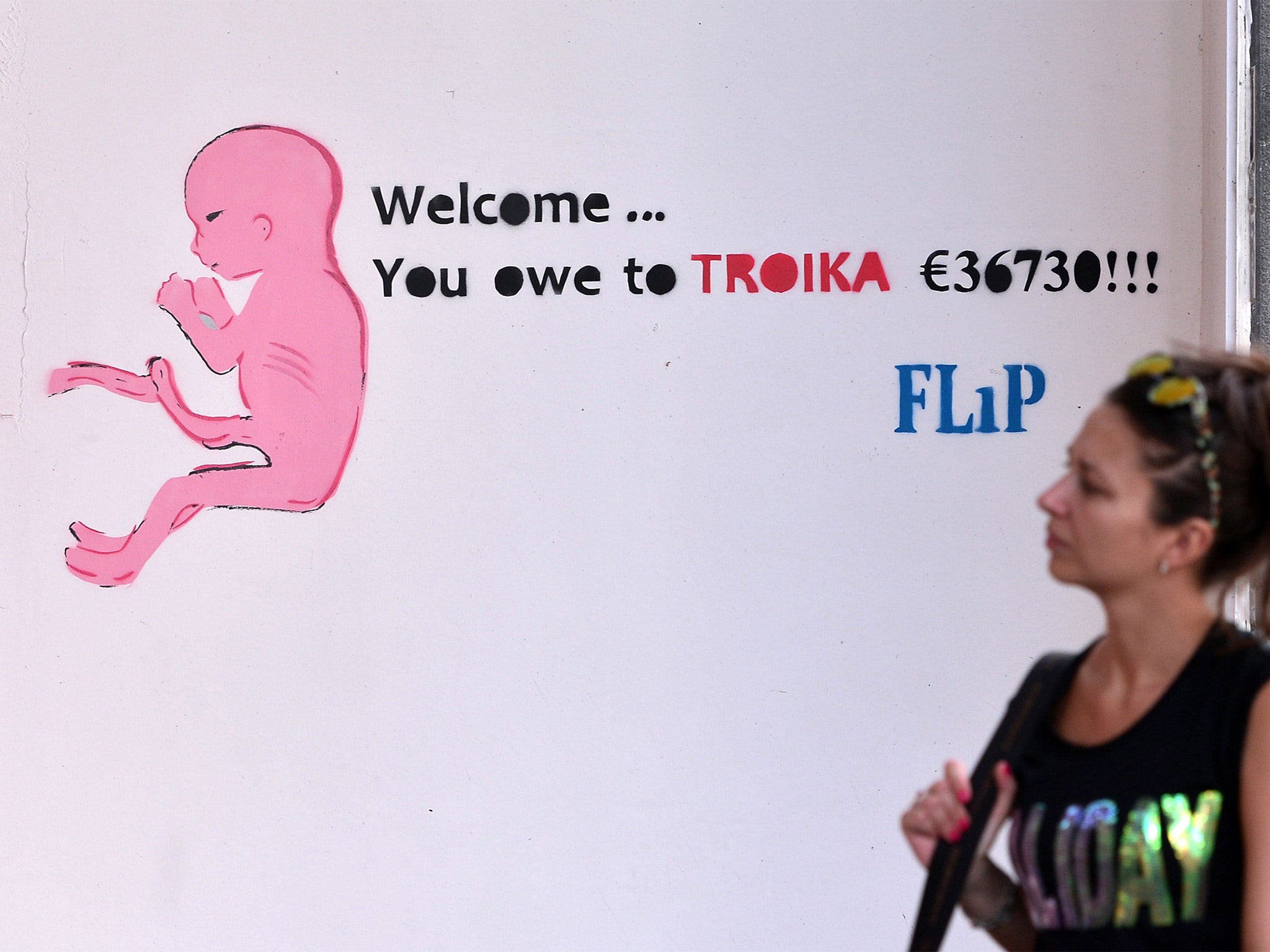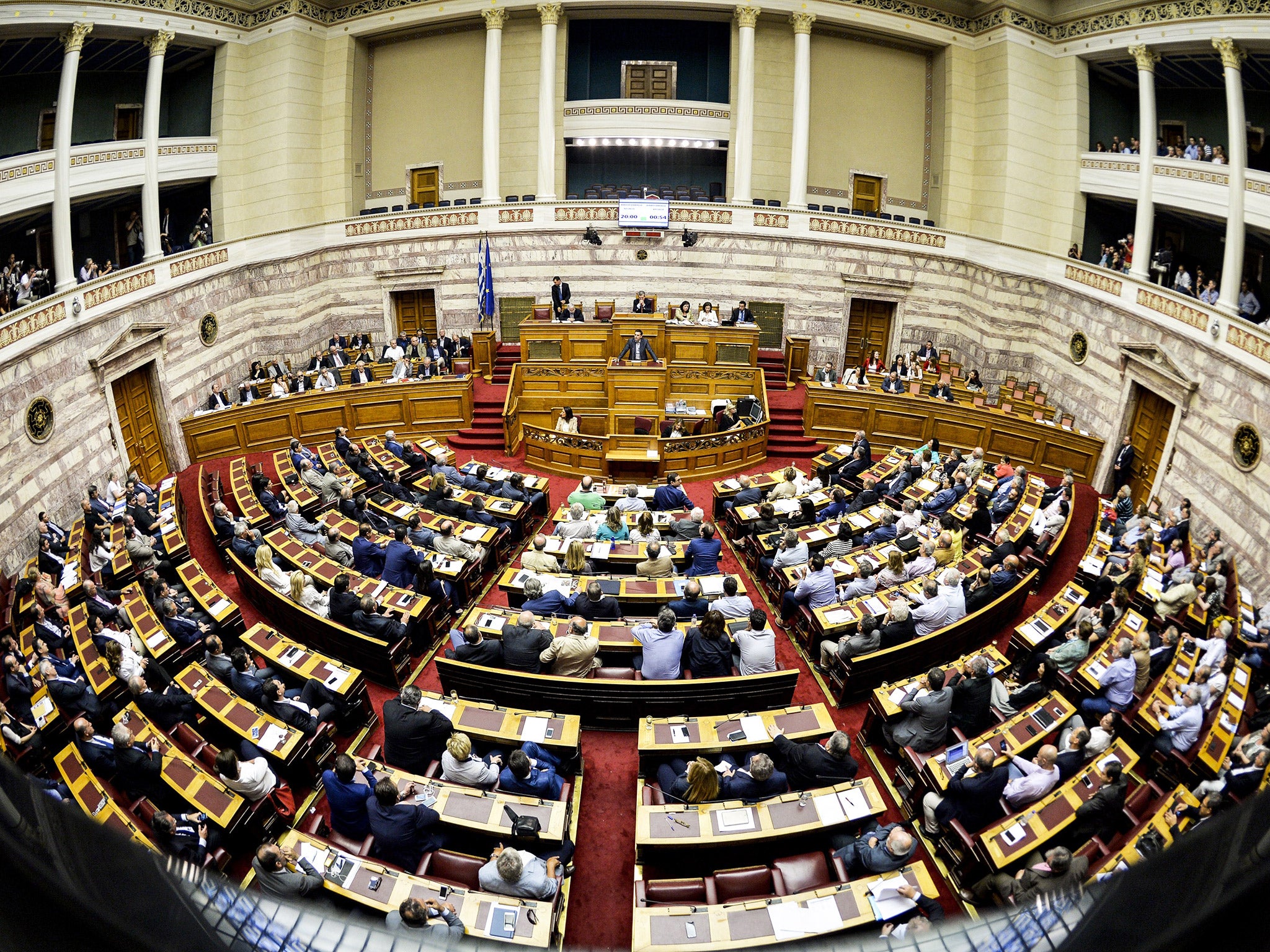Greece debt crisis: Athens likely to vote through bailout deal despite rebellion by Syriza MPs
Critics label PM Alexis Tsipras as 'an incompetent who in six months managed to destroy everything previous governments built in the past five years'

Your support helps us to tell the story
From reproductive rights to climate change to Big Tech, The Independent is on the ground when the story is developing. Whether it's investigating the financials of Elon Musk's pro-Trump PAC or producing our latest documentary, 'The A Word', which shines a light on the American women fighting for reproductive rights, we know how important it is to parse out the facts from the messaging.
At such a critical moment in US history, we need reporters on the ground. Your donation allows us to keep sending journalists to speak to both sides of the story.
The Independent is trusted by Americans across the entire political spectrum. And unlike many other quality news outlets, we choose not to lock Americans out of our reporting and analysis with paywalls. We believe quality journalism should be available to everyone, paid for by those who can afford it.
Your support makes all the difference.The protracted negotiations between Greek government officials and the international creditors are finally bearing fruit. Athens announced it has reached an accord on the broad terms of a new three-year bailout package saving it from defaulting on its debts and securing its future in the euro.
“There are difficult and even some very harsh measures [attached to the deal] but there was no other way: It was either an unruly bankruptcy or this deal,” Yiannis Balafas, an MP with the ruling Syriza party told The Independent.
The Syriza dissenter Costas Lapavitsas said he would not vote in favour of the new deal in parliament. “Left-wing governments must take left-wing actions,” he said on Mega television. Technical teams from the International Monetary Fund and European Union have been in Athens for nearly two weeks, locked in talks with the Greek officials in an effort to hammer out the conditions of the agreement which is expected to form a basis for a third bailout worth more than €86bn (£61bn).

Mr Balafas says there are positive facets to the loan agreement: it comes with a €35bn investment package and will also help Athens repay its dues to local providers, helping to jump-start the austerity-hit economy which is now suffering its third month of capital controls. Syriza says the loan agreement will also usher in debt relief – the IMF is a strong proponent of restructuring the country’s debt.
The Greek parliament will vote on the first batch of the measures and third loan agreement on Thursday, paving the way for eurozone officials to approve it at their meeting on Friday. A mandatory vote is also required in other eurozone parliaments.
The Greek coalition administration is expected to garner enough support to pass the deal through parliament but dozens of Syriza rebel MPs will vote against it. Pro-European opposition parties are likely to support the deal to keep Greece in the euro.
The opposition MP Adonis Georgiadis said: “[Alexis Tsipras] is an incompetent who in six months managed to destroy everything previous governments built in the past five years. Whatever previous administrations fended off, he’s accepted. They have signed [up to] all the demands of the Troika and have the audacity to talk about an honourable negotiation. This is a debacle.”

Aristides Hatzis, an Athens University associate professor, said that although the measures were in the positive direction, tax increases would stifle the economy. “This austerity mix is always the same failure: tax hikes which are easier for government to implement instead of spending cuts,” he said. “This agreement includes every reform in the book but I cannot see how the left-wing government will implement them.”
Syriza’s “left faction” issued a statement calling the new agreement a “noose around the people’s neck [and] a heavy blow, almost the final blow, to Greece, our crumbling economy and exhausted people”. Rebel MPs argue in favour of a Grexit. The vote on Thursday will be decisive for Syriza which came to power on the promise of ending austerity. Mr Tsipras will have to address the mutiny he faces within the ranks of his party after he yielded to the painful demands of the creditors. The break-up of Syriza appears increasingly inevitable.
Greece deal: The details
What has been agreed?
As expected, the Syriza government in Athens will implement extensive economic reforms in exchange for around €86bn (£61bn) of bailout funding from its eurozone and IMF creditors. That should enable it to meet its liabilities for the next three years, removing the prospect of default and a “Grexit” from the single currency.
At what price?
Among other things, Athens must pass laws to clamp down on early retirement, open up its energy and pharmaceutical markets and increase taxes on shipping firms.
What about austerity?
Under the terms of the deal, Greece must apparently run a primary budget deficit (before debt repayments) this year of no more than 0.25 per cent of GDP. That will be painful. Nevertheless, ministers in Athens are citing this as a victory. Previously, the country was expected to run a primary surplus of 3 per cent this year. The required primary budget surpluses for 2016 and 2017 are also much lower than before.
Ben Chu
Join our commenting forum
Join thought-provoking conversations, follow other Independent readers and see their replies
Comments